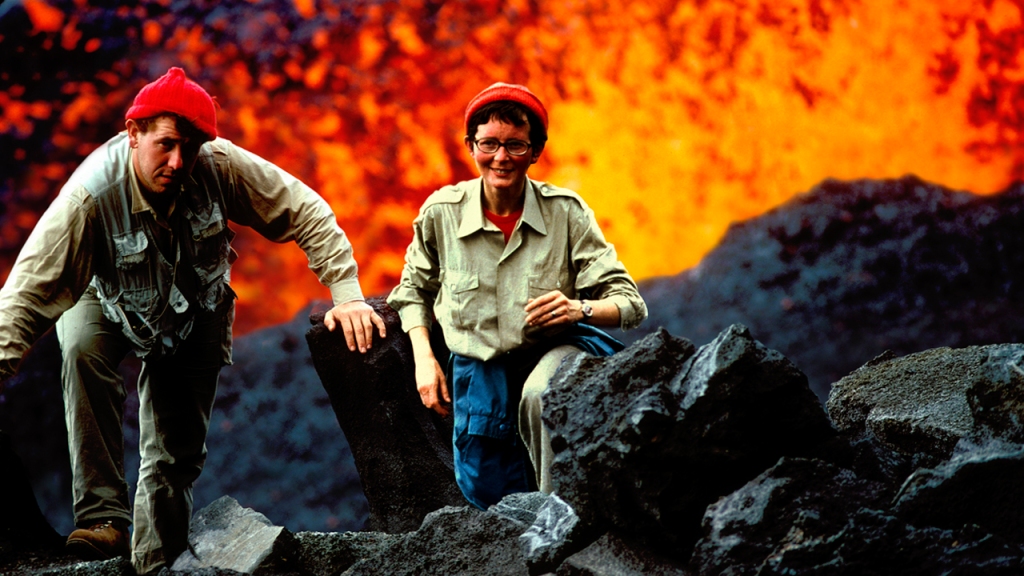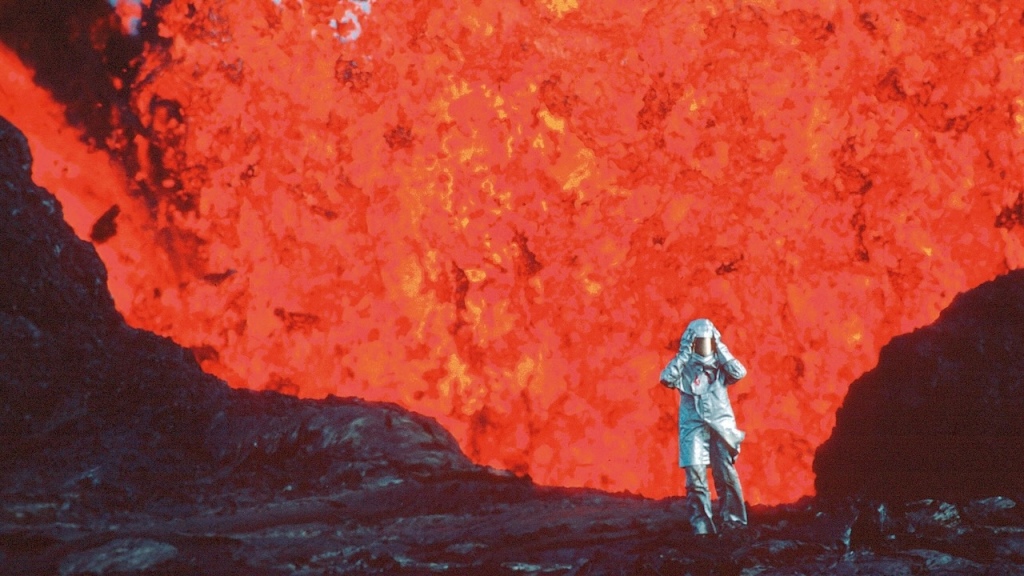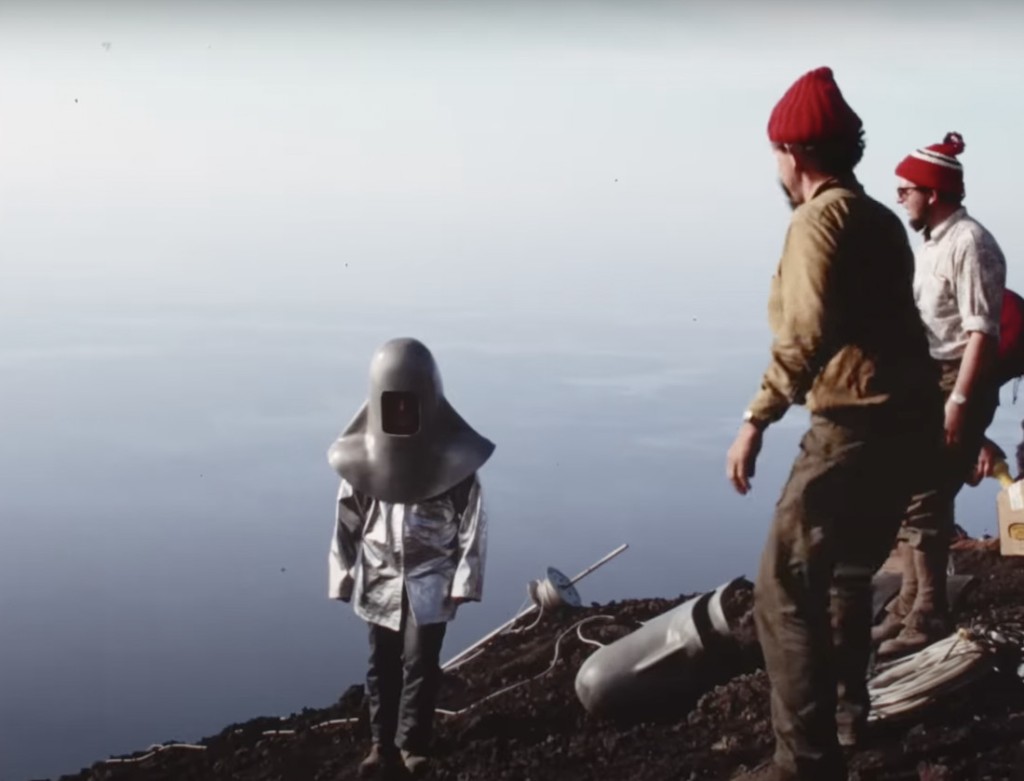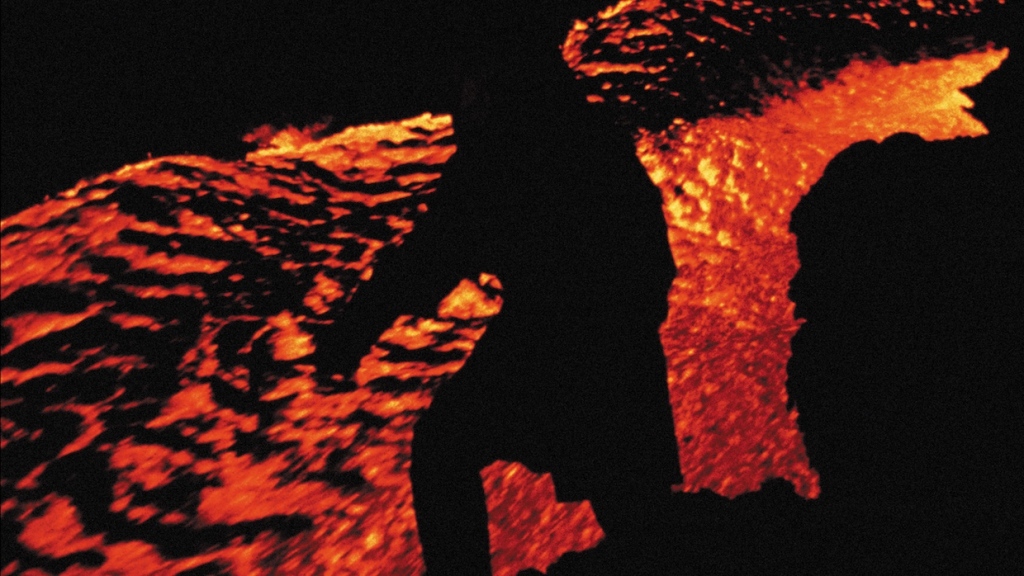Welcome to Six Damn Fine Degrees. These instalments will be inspired by the idea of six degrees of separation in the loosest sense. The only rule: it connects – in some way – to the previous instalment. So come join us on our weekly foray into interconnectedness.
It’s a story made for the movies, isn’t it? Two oddballs meet and fall in love with each other – and with volcanoes. They become documentary filmmakers and travel the world, capturing the awe-inspiring power and beauty of volcanoes on camera… until, twenty years later, they die together in an eruption. Perhaps not the happiest ending to a love story, but one so fitting it could have been penned by a screenwriter.

And while Katia and Maurice Krafft were perhaps not the most obviously cinematic couple, their work – both as volcanologists and as filmmakers – certainly was. It comes as no surprise then that they featured in not only one but two documentaries by that most quintessential, and most quintessentially unique, filmmaker, Werner Herzog, most recently in the 2022 film The Fire Within: A Requiem for Katia and Maurice Krafft. The same year, another film was released about the Kraffts: Fire of Love by Sara Dosa.
Fire of Love received much acclaim from critics and audiences and it is certainly more of a crowd-pleaser than what people generally expect when they think of documentaries. Dosa’s film knows how to tell a story, and it tells that story skillfully. It is obvious why the film won a fair number of awards and was nominated for many others. It is visually very appealing even beyond the often stunning footage by the Kraffts. It is put together with more than a touch of Wes Anderson, and the narration (performed by Miranda July, herself a writer-filmmaker) strikes a balance between melancholy and whimsy that many found engaging.

But therein lies the rub: Fire of Love seems designed to please, and in part it does so by asking very little of the audience other than to buy into the narrative of two grand parallel loves ending in capital-T tragedy. As Dosa’s film prompts emotional reactions from the people watching it, the film always leaves it clear what the audience is supposed to think and feel: this is grandiose, this is delightfully eccentric, this is tragic. Fire of Love feels somewhat like the Steven Spielberg equivalent of a documentary in how it aims to play a set range of emotions on the people watching it. Undoubtedly it does so in highly effective ways – but if you’re not willing to tune in to the film’s particular wavelength, Dosa’s take on the lives of the Kraffts can feel maudlin and twee. All in all, I liked the film (though my wife was more scathing about July’s voice-over especially), but I also felt that its emotional register was manipulative and somewhat shallow in the end: here are two people who deeply loved one another as well as the passion they shared, so when that passion ended up killing them we’re supposed to feel joyful elation alongside sadness. Fire of Love is feel-good tragedy dressed up as a documentary.
As can perhaps be expected, Werner Herzog’s The Fire Within is a very different beast. Herzog doesn’t do feel-good, and he doesn’t like, or even care, to manipulate his audience. His documentaries are not lacking in emotion, but they are his emotions, and the audience is not required, or even prompted, to share them. Herzog’s films are fine with being quizzical and even uncomfortable, with leaving the audience to figure out how they feel about the thing or the people they’re watching. Even at this point, when Herzog has become so much of an institution that his first of several Simpsons cameos was more than 12 years ago, his films remain as strange as their subjects often are.

Herzog has definitely made more subversive films than The Fire Within, but the difference between it and Fire of Love is nonetheless startling. Herzog considered his film a requiem, so the aspect of mourning is obviously present – and so is the triumph, as the director finds kindred spirits in his two subjects. Herzog’s film praises the Kraffts as filmmakers first and foremost, and it lets their footage speak for itself much of the time. Though as we see the Kraffts’ focus shift more and more from the science of volcanoes to their spectacle, it becomes difficult not to think of another prominent filmmaker-protagonist in Herzog’s filmography: Grizzly Man‘s Timothy Treadwell.
I suspect that the difference between the two films will prove rather Marmitey: some audiences will find Fire of Love deeply affecting, while others will find it too obvious and twee, while others will resonate with The Fire Within and bounce off of Dosa’s film. Film critic Matt Zoller Seitz wrote in his review of Fire of Love that Herzog’s film tells the story “in a less cohesive and fully realized way”. It is difficult to disagree: Dosa shapes her material into a more satisfying story, where Herzog resists this impulse. Personally, though, I found something pandering in Dosa’s approach, and at the very least I would consider The Fire Within to be a valuable counterpoint to Fire of Love. (It should come as no surprise that Fire of Love is available for streaming on Disney+, while The Fire Within is barely available anywhere.) The comparison between the two can teach us a lot about the choices filmmakers make in telling a story, what these choices express, what they focus on and what they downplay or even leave out. Arguably, there is value in both approaches, Herzog’s and Dosa’s, but it is startling and worth finding out how so much of the same footage about the same subject and the same two individuals can result in two entirely different films.

4 thoughts on “Six Damn Fine Degrees #165: Love in the Time of Volcanic Events”